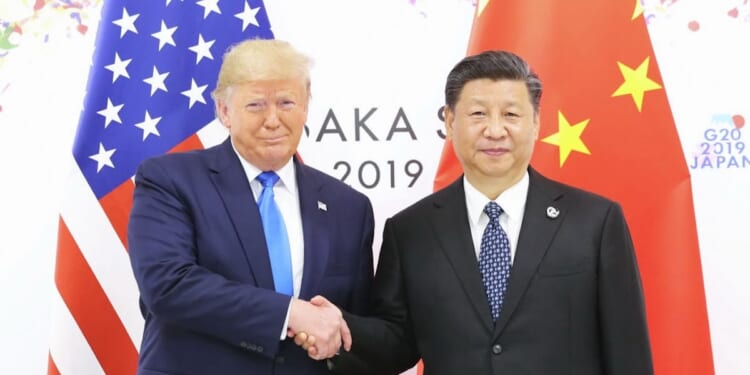President Donald Trump and Chinese President Xi Jinping are expected to agree on lower U.S. tariff rates for action on fentanyl when the two meet on Thursday, but more could be addressed.
When the two leaders meet in South Korea at 11 a.m. Thursday morning local time, Xi is expected to promise more export controls of precursor chemicals used in fentanyl production. In return, Trump will agree to cut down a 20% fentanyl-related tariff on Chinese goods by as much as half, according to The Wall Street Journal.
During a panel discussion at the White House last week, Trump said that in his meeting with Xi, the U.S. president would put fentanyl “right at the front of the list.” But Washington and Beijing have many points of friction that have been exacerbated by a trade war that began in Trump’s first term, and has ramped up since Trump took office again.
Trump was caught on a hot mic Wednesday at a state dinner in South Korea saying that he expected the meeting with Xi to run “three to four hours.”
“We’re going to have something that’s going to be very, very satisfactory to China and to us. I think we’re gonna have a — I think it’s going to be a very good meeting. I look forward to it tomorrow morning when we meet,” said Trump.
The hours-long meeting could leave time for many issues beyond fentanyl. Here’s a few that could make talks:
Soybeans
China has placed an effective embargo on purchases of American soybeans, squeezing farmers and putting political pressure on the Trump administration to deescalate tensions over trade. China is usually the top customer for American soybean farmers, but since Beijing placed high tariffs on U.S. soybeans in May, trade has disappeared.
Instead, Chinese buyers have sourced soybeans from Argentina and Brazil, raising concerns among American farmers and agriculture interests that the U.S. has been nudged out of a major market because of the trade war.
Ahead of the Trump-Xi meeting, a Chinese state-owned company purchased about 180,000 metric tons of soybeans from the U.S., about three shiploads. Agriculture Secretary Brooke Rollins celebrated the purchase as a “great start” to a better system of trade and a triumph of Trump’s negotiations with Xi.
Republican Sen. Chuck Grassley of Iowa appeared more skeptical.
“China thinks it can move the needle at the last minute, but these small purchases are not nearly enough to address the serious threats facing the ag economy,” said Grassley in a statement, according to the Iowa Capital Dispatch. “While this may be a positive sign, it’s critical that the Chinese market more fully reopens to American soybean growers soon.”
Rare Earth Minerals
China supplies an estimated 90% of the world’s rare earth minerals that are used in products that range from cell phones to fighter jets. With so many high-value products dependent on a steady supply of rare earths, the White House has been limited in its ability to leverage China on trade.
During his Asia tour this week, Trump has prioritized covering the United States’ rare earth weakness through trade pacts with other countries. On Sunday, Trump signed trade deals with Malaysia and Thailand that in part aim to diversify U.S. supply chains for the critical minerals. On Tuesday, Trump signed another deal with Japan in which the allies agreed to stockpile rare earth minerals in an effort to shore up supply chains in the case of global disruption.
Even with the trade deals, China still reserves major advantages in the supply of rare earths. China is the sole global producer of samarium, a mineral used in the production of many military technologies. Also, China is the only country that has managed to refine ultrapure dysprosium, used in the production of high-end chips.
Negotiators from Washington and Beijing have reportedly come to an initial agreement on a rare earth minerals deal ahead of the Trump-Xi meeting. Under the proposed structure, the United States would pause a rise in steel tariffs and China would lift some export controls.
Detained Americans
On October 22, a group of GOP lawmakers sent a letter to Trump calling on him to negotiate a release of Americans held in China. Sen. Dan Sullivan of Alaska and Reps. John Moolenaar of Michigan and Chris Smith of New Jersey pushed Trump to secure the release of seven detained Americans, including Ezra Jin, who was arrested earlier this month for his role leading an underground church.
Other cases argued for by the lawmakers include two Americans who they say are victims of trafficking, a lawful U.S. resident who was arrested for making artwork critical of the Chinese regime, the families of reporters for the U.S. state broadcaster Radio Free Asia, and the sister of a Uyghur human rights activist.
This includes two Americans accused of drug-smuggling who lawmakers say are victims of trafficking; a lawful permanent U.S. resident arrested for creating artwork critical of the Chinese government; the families of journalists who worked for the U.S.-government outlet, Radio Free Asia; and the sister of a Uyghur human rights activist based in the U.S.
2020 “Phase One” Trade Deal
In January 2020, the U.S. and China struck a “Phase One” deal in which China agreed to purchase an extra $200 billion-worth of U.S. agricultural, energy, and other goods over the next two years, as well as increase protections for intellectual property. China failed to meet its obligations over the course of 2020 and 2021, falling short in its purchases of U.S. goods by over 40%.
Beijing blamed the failure on the COVID-19 pandemic while the Trump administration has been quick to criticize its predecessor, former President Joe Biden, for insufficiently policing the agreement.

















